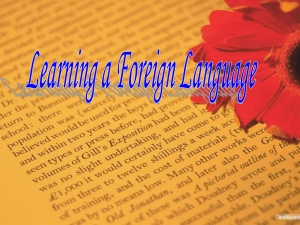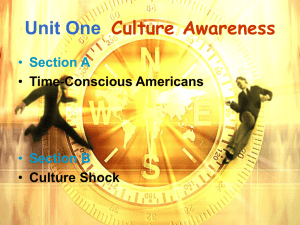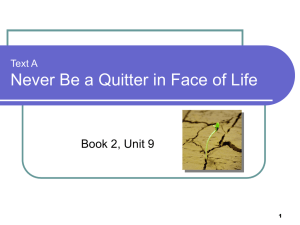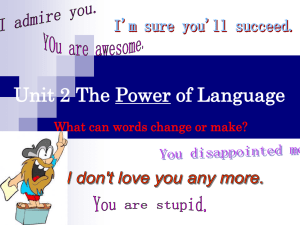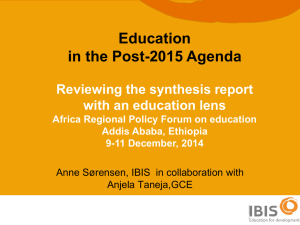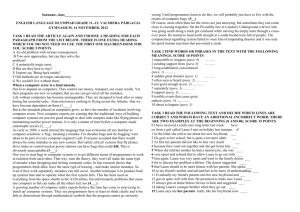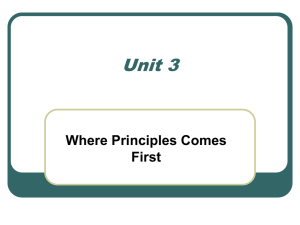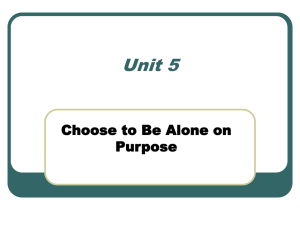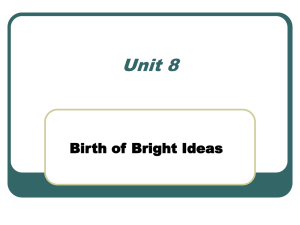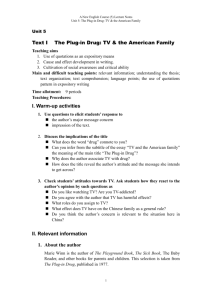Section B: Does Exercise Have Unexpected Benefits?
advertisement
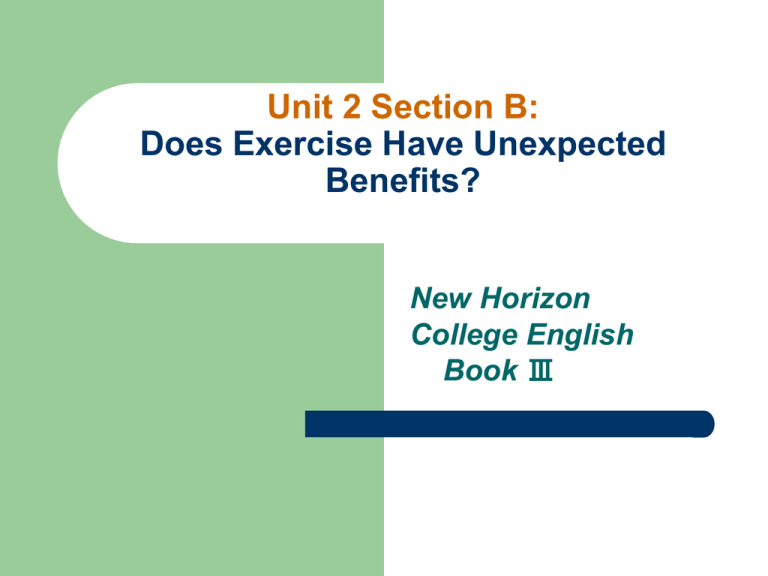
Unit 2 Section B: Does Exercise Have Unexpected Benefits? New Horizon College English Book Ⅲ Contents I. Reading skill II. Fast reading. III. Structure of the text. IV. Important Words V. Detailed study of Text VI. Exercises I. Reading skill ----- Distinguishing Between Facts and Opinions 1.How to distinguish facts and opinions Facts are statements that tell what really happened or what really is the case. A fact can be proved or disproved with direct evidence. Opinions are statements of belief, judgment or feeling. They show what someone thinks or feels about a subject. Solid opinions are based on facts. However, opinions are still somebody’s view of something and are not facts themselves. 2.Practice Distinguish Between Facts and Opinions “We found that women who were normally inactive and then started a program of moderate exercise showed evidence of iron loss,” says Roseanne M.Lyle, associate professor at Purdue. (Para. 2, Passage A) Key: This is a fact as the sentence is simply a quotation from Lyle. In the third and final stage, people often feel weak, tired, and out of breath----and exercise performance is severely compromised. (Para.7, Passage A) Key: This is a fact as the sentence reports how people feel in the final stage. “Select breads and cereals with the words ‘iron-added’ on the label,” writes sports diet expert Nancy Clark. (Para. 11, Passage A) Key: This is a fact. Please note that this is a case where a writer may present an opinion as if it were a fact. We say it is a fact because the sentence is a piece of quotation. Athletes in high-impact sports such as running may also lose iron through a phenomenon where small blood vessels in the feet leak blood. (Para. 6, Passage A) Key: This is an opinion as the word “may” in the sentence shows the writer’s attitude towards the matter being talked about. If iron levels are low, talk with a physician to see if the deficiency should be corrected by modifying your diet or by taking supplements. (Para. 10, Passage A) Key: This is an opinion expressed in an imperative sentence, which indicates an opinion from the writer. back II. Fast reading. 1. ________ can benefit from physical exercise. ____. A. Only the heart and lungs B. Only bones and muscles C. Only the brain D. All of the above 2. What makes the brain better able to process information? A. Vigorous physical exercise. B. Skill-based exercise. C. Both of them. D. Neither of them. 3. While ________ of rats showed a greater number of brain connections, _______ had a greater density of blood vessels in the brain. A. the first group/the third group B. the second group/the third group C. the first group/the second group D. the second group/the first group 4. One possible reason for scientists to make experiments with rats or other animals is that ________. A. rats benefit from the experiments B. the experiments can boost the brains of the rain C. an effect found in rats may also apply to humans D. rats and humans are very much alike 5. Which word in Paragraph 6 tells us that older adults were divided into two groups in the human studies? A. Corresponding. B. Inactive. C. Older. D. Faster. 6. Which of the following is not a finding that results from the studies of older adults? A. Regular exercise can improve the speed with which the brain processes information. B. Inactive adults can hit buttons faster in response to a tone after being trained. C. Getting old is the cause for the reduction in mental function. D. Exercise can make on smarter. 7. Now some scientists have come to know that the academic edge derives from _____. A. regular physical activity B. increased self-confidence C. the better mood D. the ability to concentrate 8. What does the sentence “Mind is body, and body is mind” (Para. 11) mean? A. Mind and body are equal in importance. B. Mind goes first and body second. C. Body goes first and mind second. D. Mind and body are equal in function. back III. Structure of the text: Part I (Para.1-7)): Scientific studies on both rats and older adults prove that physical exercise can promote mental functioning. Part II (Para.8-11): Scientists further infer that physical exercise actually influences mind and body alike. back IV. Important Words succession:(n.) a) a number of persons or things following one after the other E.g. He took a succession of jobs from which he got much experience. 他做过很多工作,从中获取了很多经验。 b) The act of following one after the other E.g. His words came out in quick succession. 他一口气说出一串话。 Our school has won the speech contest for the third year in succession. 我们学校连续第三年获得演讲比赛第一名。 imply:(vt.) suggest; indicate; express indirectly; E.g. His manner implies that he would like to come with us. 他的行为表明他愿意和我们一起走。 Are you implying that I am the one to blame? 你是说这是我的责任? COMPARE: imply\apply\supply primary:(adj.) a) chief; main E.g. 汤姆失败的主要原因是懒惰 A primary cause of Tom’s failure is his laziness. b) earliest in time or order of development E.g. primary color; The primary meaning of a word; c) (of education or a school) for children between 5 and 11 years old E.g. a primary school; 小学 primary education; 初 等教育 primary pupils小学生 benefit from: gain advantages, pleasure, or profit from sth. Eg: Did you benefit from your holiday? 度假对你有好处吗? I think the boy would benefit by further study. 我想继续学习会对孩子有好处。 Both sides benefit from the talk. 双方都从谈话中获益。 in contrast: being different from sth. In contrast, the lives of girls in well-to-do families were often well sheltered. 相比之下,家境富有的女孩生活常常很有保障。 The rich people, by contrast, have more money to spend. 与之相比,富人有更多的钱花。 go through: pass or complete( a stage, task, etc.) I have to go through the final examination before I can leave school. 我得通过期末考试后才能离校。 Your suggestion has to go through several stages. 你的建议得经过几个步骤。 speculate: guess John refused to speculate about the content of the letter. 约翰拒绝猜测信的内容。 The reader speculate what will happen next. 读者可以推测接下来会发生什么事。 back V. Detailed study of Text 1. A succession of scientific studies of animals implies that physical activity has a positive effect on mental functioning. (Para.1) 对动物的一系列科学研究表面,体育活动对智 力的发挥有积极作用。 a succession of:a number of persons or things following one after the other have an effect on sth. : affect; influence 2. ……and skill-based exercise increases the formation of connections in the brain (Para. 2) Skill-based exercise: exercise that emphasizes skills, such as fencing and shooting Formation: the shaping or development of sth. 3.Learning a new dance step may boost the brain in the same way that learning a language can. (Para.5) 学习一种新的舞步和学习一种语言一样,都能 促进大脑发展。 Learning a new language can improve the brain, and so can learning a new dance step. boost: help to improve or advance 4. But until recently, the academic edge gained by participating in sports was thought to come from …… (Para. 9) 但是直到最近,人们还认为因参加体育活动而获得的 学业优势来自于…… But until recently, the academic advantages that one has gained by taking part in sports was thought to come from…… academic: concerning teaching or studying, esp. in college or university edge: advantage that makes one stronger or more likely to be successful back VI. Exercises Finish the rest exercises on Book II, page 55-56. back The End


